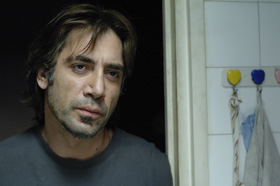 HOLLYWOOD, Calif. — Javier Bardem returns to the big screen in Biutiful, a love story between a father and his children.
HOLLYWOOD, Calif. — Javier Bardem returns to the big screen in Biutiful, a love story between a father and his children.
This is the journey of Uxbal, a conflicted man who struggles to reconcile fatherhood, love, spirituality, crime, guilt and mortality amidst the dangerous underworld of modern Barcelona. His livelihood is earned out of bounds, his sacrifices for his children know no bounds. Like life itself, this is a circular tale that ends where it begins. As fate encircles him and thresholds are crossed, a dim, redemptive road brightens, illuminating the inheritances bestowed from father to child, and the paternal guiding hand that navigates life’s corridors, whether bright, bad – or biutiful.
"Biutiful for me is a reflection akin to our brief and humble permanence in this life," explains director Alejandro González Iñárritu. "Our existence, short-lived as the flicker of a star, only reveals to us its ineffable brevity once we are close to death. Recently, I thought of my own death. Where do we go and what do we transform into when we die? Into the memory of others. This is the anguishing and dizzying race against time that Uxbal faces. What does a man do in his final days of life? Does he dedicate himself to living or to dying? Perhaps Kurosawa was right when he said our dreams of transcendence are just that: an illusion. Regardless, since the film’s inception, I was never interested in making a movie about death, but a reflection in and about life when our inevitable loss of it occurs."
He adds, " I dedicated this film to a family member – not because they are part of my family but because they are the reason, the source, or who I want to speak to directly through the film. This one is for my Father, and he knows well why."